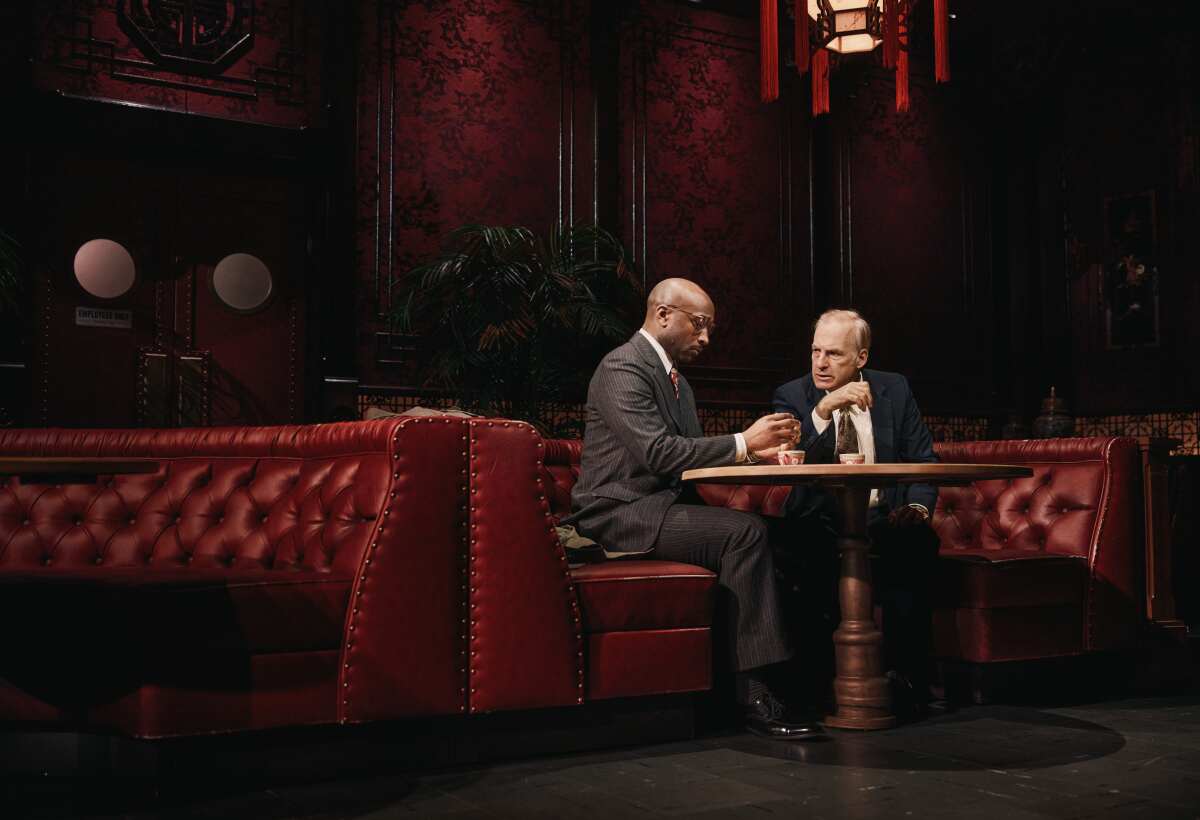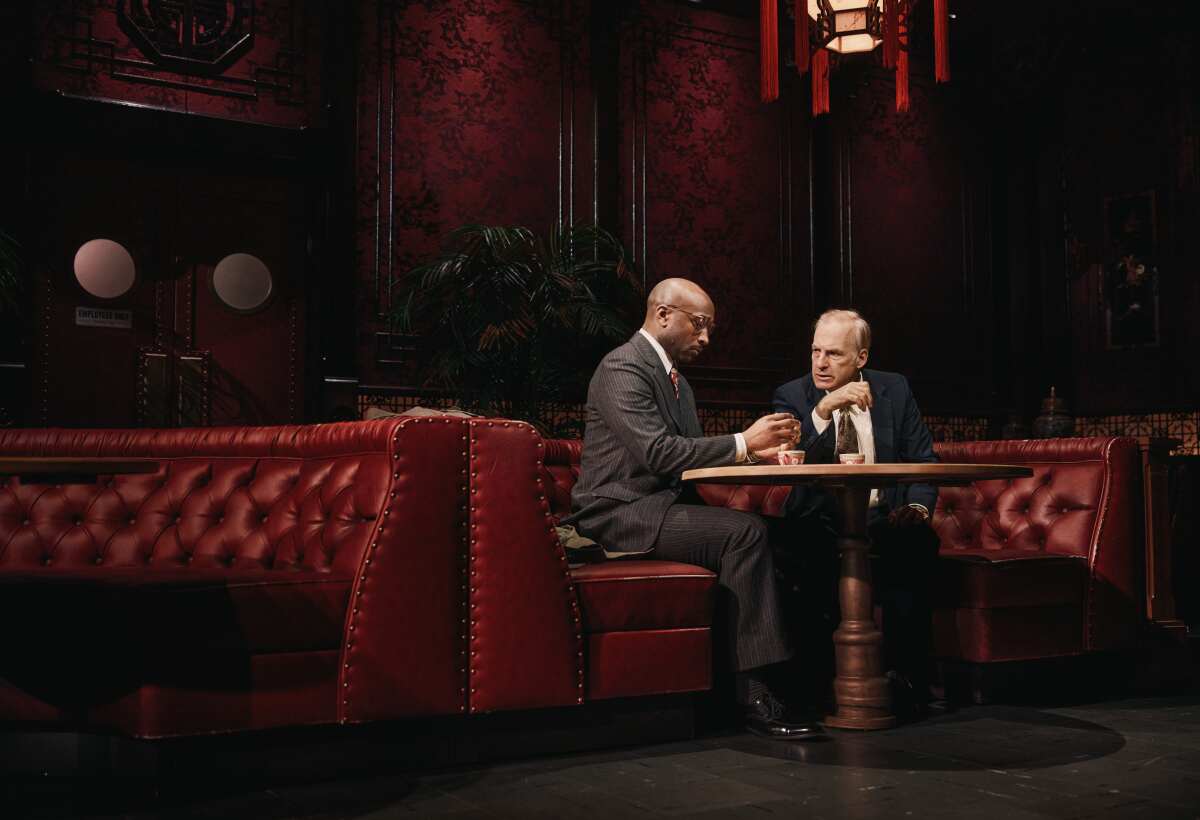One man is the consummate professional, calm and seen-it-all experienced, ready to handle any assignment. The other lacks all that but throws himself almost recklessly into the mix, relying on charm and quick-on-his-feet wit as he strives for something that feels just beyond him.
I could easily be describing Chuck and Jimmy McGill (a.k.a. Saul Goodman), the two brothers brilliantly portrayed by Michael McKean and Bob Odenkirk in “Better Call Saul.”
But these days the description fits McKean, 77, and Odenkirk, 62, in real life as they take the stage, along with Kieran Culkin and Bill Burr, in “Glengarry Glen Ross,” David Mamet’s profane play about real estate salesmen whose souls are being ground to dust by the eternal chase for dollars.
McKean has regularly graced the stage in recent decades, appearing in works by everyone from John Waters to Harold Pinter to William Shakespeare. “It’s as much fun as it looks,” he says, adding that he can’t really give advice to his former small-screen sibling about treading the boards. “It just seems so logical,” he says.
Odenkirk’s stage experience: one play in Chicago for a month when he was 21. “I don’t remember much about it,” he says dryly during our lunch, adding that while he’s read books about Shakespeare he’s never even seen one of his plays.
After less than a week of previews for his Broadway debut, he sounds a bit dazzled by the ease with which McKean and Culkin, another experienced theater actor, inhabit the stage: Odenkirk calls the pair Broadway actors while describing himself as a “nonsense actor.” He feels like he’s getting a free education in theater.
“I still don’t understand it,” he admits. “I’m the only one who’s a little off, but I’m going to get there.” (McKean encourages him by saying that the previous night he was so emotionally caught up in Odenkirk’s Shelley that he almost missed a cue.)

Bob Odenkirk, right, confers with Donald Webber Jr. in “Glengarry Glen Ross.”
(Emilio Madrid)
Odenkirk says director Patrick Marber talked about reaching that Zen zone where you’re not running lines or motivations or physicalizations in your head. “You’re just existing and this play comes out of you,” Odenkirk says. “I see that on the horizon, but I haven’t experienced it myself yet.
“I’m excited about a play being a living thing that changes each time,” he adds, “but I’m still thinking, ‘What if I start on this foot?’ I’m still trying to engineer moments like you can in TV where you have more control. But you never get a print here. You just do it again tomorrow.”
Odenkirk quips that he thought he was “just doing a show, but it turns out I’m ‘doing Broadway.’” And that, McKean points out, is a rarefied world.
“It’s fun to be a part of once, but I’m an interloper as I always am, so it’s not easy,” Odenkirk says, explaining that he doesn’t expect to return … unless, he jokes, they do a Broadway version of “Brian’s Song” with McKean in the Billy Dee Williams role.
But Odenkirk is game for the stage role, saying he loved how “Better Call Saul” stretched his acting muscles — “that was really good for me” — and he believes this will too. One bonus: There’s some of Saul in his character, Shelley Levene.
Shelley is overeager and desperate; he just lacks Jimmy’s/Saul’s imagination and gumption. “People know me as a striver, someone who’s always coming up with devious, clever ways around things, who then gets punched in the face by the world over and over,” Odenkirk says.
McKean, meanwhile, plays George Aaronow, a salesman he describes as “pathetic” even compared to Shelley; obviously someone very different from Chuck McGill. But McKean says he consciously mixed up roles early in his career to avoid pigeonholing — from Lenny on “Laverne & Shirley” to David St. Hubbins in “This Is Spinal Tap” to Edna Turnblad (“Hairspray”) and J. Edgar Hoover (“All the Way”) on Broadway.
For all his lack of stage experience, Odenkirk had “Glengarry” in his sights for years. Two decades ago, he wrote to Mamet asking permission to do a “purely comic version where instead of land sales it would be pots and pans” ; the cast would have also featured his “Mr. Show” co-star David Cross and Fred Willard. Unsurprisingly, Mamet never responded. More recently he tried again, without the pots and pans but with characters using cellphones. He hoped to have Burr in that cast. Mamet wrote back but said no.
So when Odenkirk was offered the role in this production he jumped at the chance to step into the shoes worn by Jack Lemmon, Alan Alda and Al Pacino. Mamet’s play debuted on Broadway in 1984 after premiering in London the year before; in addition to a 1992 film adaptation starring Lemmon as Levene, there have been two Broadway productions of the show in the last 20 years. One reason the show keeps coming back is that there’s plenty of scenery to chew for the top-flight actors — Alda’s co-stars in the 2005 revival included Liev Schreiber and Jeffrey Tambor, while Pacino was joined by Bobby Cannavale and John C. McGinley in 2012.
But McKean says the play offers more than showy roles. “It’s about toxic masculinity and what’s in our nature,” he says. “There’s the slow boil everyone is on in a game with high stakes where your success says something about how much of a man you are.”
These salesmen “love what they’re doing and it’s killing them,” Odenkirk says, calling the four-decade old play more relevant than ever before.
“Now everyone is in this cage match of capitalism unbridled without a [functional] Justice Department and with all the watchdogs being let go,” he says. “It’s just you guys beat each other to shreds, and we’ll watch and the money will go up the chain.”
This leads Odenkirk to ask McKean if he’s ever seen the 1969 documentary “Salesman,” centered on employees of the Mid-American Bible Co. pitching their wares door to door. “That film invented a lot about what we take for granted as a great documentary,” the younger of the pair says. A digression ensues as the pair chats about anything and everything, from whose dog is cuter (a much friendlier competition than the cutthroat “Glengarry”) to Monty Python, comedy duo Bob and Ray, and Odenkirk’s next movie, “Normal.” Also discussed: a long-ago Chicago play called “Bleacher Bums” and where they each lived while working on “Saturday Night Live.”
Although they didn’t overlap on “SNL,” they met while McKean was there. A few years later, McKean made an appearance on “Mr. Show,” as a condescending law professor, a forerunner of Chuck McGill, while Odenkirk’s character on that episode has a touch of Jimmy McGill’s DNA.
Odenkirk spends much of our lunch celebrating McKean, repeating twice that his co-star, in a scene with Burr (a stand-up also making his Broadway debut), is getting “Glengarry’s” biggest laughs. He also brings up McKean’s early comedy records, saying, “Wait, can we just talk about the Credibility Gap?,” a troupe that included Harry Shearer and “Laverne & Shirley” compatriot David L. Lander. (McKean, meanwhile, can still recite lines from his favorite “Mr. Show” skits, including “The Fad 3.”)
After our meal, McKean, casual and rumpled, tugs on his old Brooklyn Dodgers hat (“I went to my first game at Ebbets Field,” he had mentioned), is a man very much at home. We had, in fact, met at a diner just blocks from his apartment. Odenkirk, by contrast, is trim and fit and dressed sharply, with a black-and-red Chicago Cubs cap atop his head.
Odenkirk stops in a bank after our meal because he’d given his last few dollars to a mariachi in the subway. He makes small talk about baseball with the security, but the ATM just won’t give him cash. It turns out his card is inserted backward, fitting for a man who feels a little out of place here. Unlike his characters, Odenkirk is calm and gracious. When it’s time to go, he takes one last opportunity to say: “Make sure the story talks about how great Michael McKean is.”
